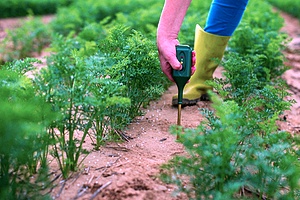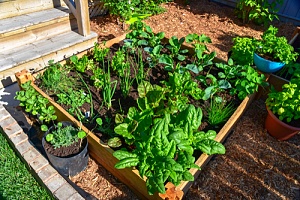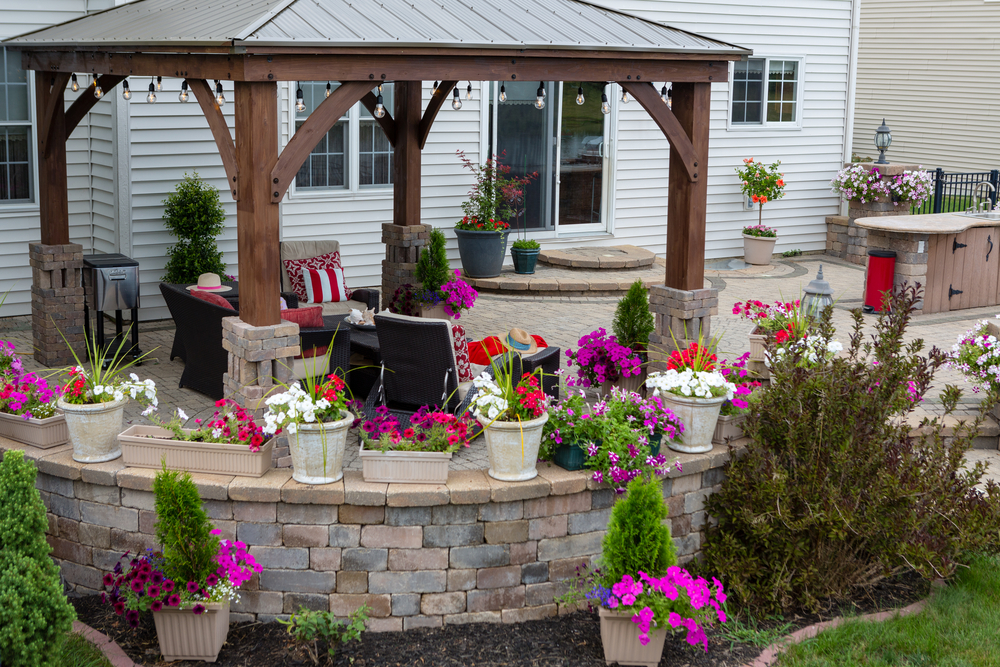Pest control must be done with utmost consideration to safety; safety in terms of the plants, animals and humans. This holds especially true for those with vegetable and organic gardens. The main purpose of growing vegetables organically will be defeated if they become tainted with pest control chemicals. Here are a few long-term maintenance tips to control garden pests. Improve your plant yield with environmentally friendly options.
Physical Process
Use the physical pest control process. This may be accomplished through picking grubs off by hand, creating barriers and traps and plugging holes. Snails can be found hiding in damp places under rocks and towrds the base of those plants with straplike foliage.
Biological Control
Encourage predatory insects such as green lacewings and dragonflies to feed on aphids and other pests that attack your plants. You can do this by placing a shallow bowl of water in the garden. Dragonflies especially will hover around water. Bacterial insecticides such as B. thuringiensis could also be used against caterpillars.
Chemicals
Organic pest control methods can be successful and the ingredients for many of the recipes can be found in the kitchen cupboards. If chemical sprays are really necessary, try and find the least-toxic. These include insecticidal soaps, horticultural oils, dehydrating dusts, etc.
Safer Substitutes
Recipes for alternative pest control include the following:
- Against Green Aphids and Mites – Mix 1 tablespoon of liquid soap and a cup of vegetable oil. Dilute a teaspoon of this solution in a cup of water and spray on aphids and mites.
- Against Cockroaches – Dusts of boric acid can be applied to cracks or entry points of these insects. Bay leaves on pantry shelves could also help in warding off these critters.
- Make sure that the chemicals you use are made specifically for the insects you are targeting.
Dealing with Garden Pests
While tending to my own garden, I have found that one of the most frustrating things that can happen to a gardener is to walk outside to check on your plants. It’s just a routine walk to make sure that your garden is thriving, but you end up finding holes in all of your plants that looked fine only hours before. The explanations for some of these plant-destroying holes are garden pests. Some of the main garden pests are slugs, worms, caterpillars, birds, snails, and the occasional gopher. Although you can never wipe out these pests entirely, after all your hard work in the garden you have to do something, to control garden pests.
Insects
Insects are one of the worst things to have in your garden; they can live under the soil, in old weeds or piles of leaves, or in a number of other places. In order to help keep insects away, always try and eliminate places in your garden and near your garden that these insects and other plant diseases could be living. Remove old leaves, weeds, or any other decaying matter that insects and diseases could be living in from your yard. Also, regularly turn over your garden soil and break apart any clumps of dirt so that you can eliminate the living spaces any insects
that might be hiding underground.
Sprays
Another way to rid your garden of the pests is to use dormant spray, which is used to keep destructive insects and diseases under control. It is best that you use dormant spray when your plants are dormant, usually around February or early March. I have used dormant spray many times on my garden and it has worked wonders on keeping insects out. But as I learned from experience, dormant spray is only effective if you follow the correct instructions. When I first decided to use some on my garden, I just dumped it everywhere in hopes of killing everything harmful. Unfortunately I ended up killing my entire garden along with my neighbors. Some insects can be beneficial to your garden though, so be sure to find out which insects help your garden.
Birds
Another pest problem I’ve had besides insects has been birds. Whenever I see birds in my garden I run outside a chase them away, but as soon as I step inside they come right back. The solution that I’ve come up with to keep the birds away from my garden is to put a bird feeder in my yard. Instead of costing me time and money by eating my garden, the birds eat at the bird feeder. In the long run it’ll save you money. Not only can a bird feeder help keep birds away from your garden, but they can also be a new part of your yard decoration. Although not completely eliminating my bird problem, my bird feeder has made the problem smaller. Getting a dog has also helped.
The Gopher
If you start seeing mounds of dirt around your yard, and your plants keep unexplainably dying, you can assume that you have a gopher problem. Thankfully, this is one of the few garden pasts that I haven’t had. However my friend has struggled with a tremendous gopher infestation, so I decided to research it. Gophers are rodents that are five to fourteen inches long. Their fur can be black, light brown, or white, and they have small tails. One method of getting rid of these root-eating pests is to set traps. The key to successfully capturing a gopher using a trap is to successfully locate the gopher’s tunnels and set the trap correctly. Another way to get rid of them is to use smoke bombs, which you place into the tunnel and the smoke spreads through out it and hopefully reaches the gopher.
Effective Garden Pest Control with Organic Methods
When dealing with garden pests, especially in vegetable and organic gardens, it’s crucial to use environmentally friendly methods to protect your plants. Employing organic pest control strategies, such as encouraging predatory insects like green lacewings and using non-toxic sprays, can significantly reduce pest populations. Additionally, removing decaying plant matter and regularly turning soil can prevent insects from establishing colonies. By integrating these practices, you can effectively manage garden pests while maintaining the integrity of your organic garden.
If you suspect that your gardens are being pillaged by any of the pests I mentioned, I encourage you to try your hardest to eliminate the problem as soon as possible. The longer you let the species stay, the more established it will become.
Summary

Dirt Connections was started with one goal in mind: providing quality residential and commercial construction services to clients on time and on budget. Reach out for more information on how we can support your next project.
For your convenience our estimates are free and by appointment. Call 703-940-9949 for a free estimate today!













































